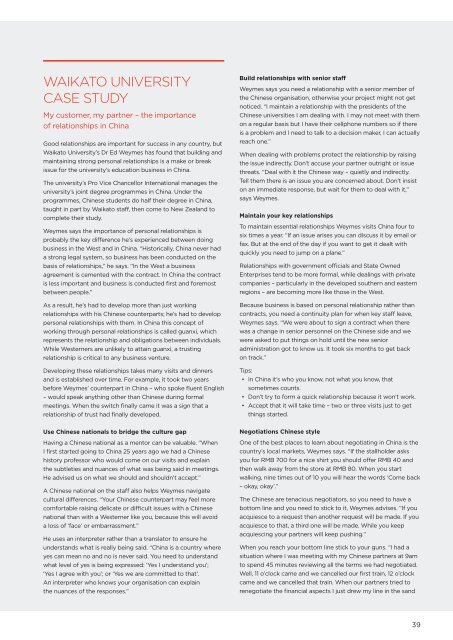Navigating China Guide (2012) - New Zealand Trade and Enterprise
Navigating China Guide (2012) - New Zealand Trade and Enterprise
Navigating China Guide (2012) - New Zealand Trade and Enterprise
You also want an ePaper? Increase the reach of your titles
YUMPU automatically turns print PDFs into web optimized ePapers that Google loves.
WAIKATO UNIVERSITY<br />
CASE STUDY<br />
My customer, my partner – the importance<br />
of relationships in <strong>China</strong><br />
Good relationships are important for success in any country, but<br />
Waikato University’s Dr Ed Weymes has found that building <strong>and</strong><br />
maintaining strong personal relationships is a make or break<br />
issue for the university’s education business in <strong>China</strong>.<br />
The university’s Pro Vice Chancellor International manages the<br />
university’s joint degree programmes in <strong>China</strong>. Under the<br />
programmes, Chinese students do half their degree in <strong>China</strong>,<br />
taught in part by Waikato staff, then come to <strong>New</strong> <strong>Zeal<strong>and</strong></strong> to<br />
complete their study.<br />
Weymes says the importance of personal relationships is<br />
probably the key difference he’s experienced between doing<br />
business in the West <strong>and</strong> in <strong>China</strong>. “Historically, <strong>China</strong> never had<br />
a strong legal system, so business has been conducted on the<br />
basis of relationships,” he says. “In the West a business<br />
agreement is cemented with the contract. In <strong>China</strong> the contract<br />
is less important <strong>and</strong> business is conducted first <strong>and</strong> foremost<br />
between people.”<br />
As a result, he’s had to develop more than just working<br />
relationships with his Chinese counterparts; he’s had to develop<br />
personal relationships with them. In <strong>China</strong> this concept of<br />
working through personal relationships is called guanxi, which<br />
represents the relationship <strong>and</strong> obligations between individuals.<br />
While Westerners are unlikely to attain guanxi, a trusting<br />
relationship is critical to any business venture.<br />
Developing these relationships takes many visits <strong>and</strong> dinners<br />
<strong>and</strong> is established over time. For example, it took two years<br />
before Weymes’ counterpart in <strong>China</strong> – who spoke fluent English<br />
– would speak anything other than Chinese during formal<br />
meetings. When the switch finally came it was a sign that a<br />
relationship of trust had finally developed.<br />
Build relationships with senior staff<br />
Weymes says you need a relationship with a senior member of<br />
the Chinese organisation, otherwise your project might not get<br />
noticed. “I maintain a relationship with the presidents of the<br />
Chinese universities I am dealing with. I may not meet with them<br />
on a regular basis but I have their cellphone numbers so if there<br />
is a problem <strong>and</strong> I need to talk to a decision maker, I can actually<br />
reach one.”<br />
When dealing with problems protect the relationship by raising<br />
the issue indirectly. Don’t accuse your partner outright or issue<br />
threats. “Deal with it the Chinese way – quietly <strong>and</strong> indirectly.<br />
Tell them there is an issue you are concerned about. Don’t insist<br />
on an immediate response, but wait for them to deal with it,”<br />
says Weymes.<br />
Maintain your key relationships<br />
To maintain essential relationships Weymes visits <strong>China</strong> four to<br />
six times a year. “If an issue arises you can discuss it by email or<br />
fax. But at the end of the day if you want to get it dealt with<br />
quickly you need to jump on a plane.”<br />
Relationships with government officials <strong>and</strong> State Owned<br />
<strong>Enterprise</strong>s tend to be more formal, while dealings with private<br />
companies – particularly in the developed southern <strong>and</strong> eastern<br />
regions – are becoming more like those in the West.<br />
Because business is based on personal relationship rather than<br />
contracts, you need a continuity plan for when key staff leave,<br />
Weymes says. “We were about to sign a contract when there<br />
was a change in senior personnel on the Chinese side <strong>and</strong> we<br />
were asked to put things on hold until the new senior<br />
administration got to know us. It took six months to get back<br />
on track.”<br />
Tips:<br />
• In <strong>China</strong> it’s who you know, not what you know, that<br />
sometimes counts.<br />
• Don’t try to form a quick relationship because it won’t work.<br />
• Accept that it will take time – two or three visits just to get<br />
things started.<br />
Use Chinese nationals to bridge the culture gap<br />
Having a Chinese national as a mentor can be valuable. “When<br />
I first started going to <strong>China</strong> 25 years ago we had a Chinese<br />
history professor who would come on our visits <strong>and</strong> explain<br />
the subtleties <strong>and</strong> nuances of what was being said in meetings.<br />
He advised us on what we should <strong>and</strong> shouldn’t accept.”<br />
A Chinese national on the staff also helps Weymes navigate<br />
cultural differences. “Your Chinese counterpart may feel more<br />
comfortable raising delicate or difficult issues with a Chinese<br />
national than with a Westerner like you, because this will avoid<br />
a loss of ‘face’ or embarrassment.”<br />
He uses an interpreter rather than a translator to ensure he<br />
underst<strong>and</strong>s what is really being said. “<strong>China</strong> is a country where<br />
yes can mean no <strong>and</strong> no is never said. You need to underst<strong>and</strong><br />
what level of yes is being expressed: ‘Yes I underst<strong>and</strong> you’;<br />
‘Yes I agree with you’; or ‘Yes we are committed to that’.<br />
An interpreter who knows your organisation can explain<br />
the nuances of the responses.”<br />
Negotiations Chinese style<br />
One of the best places to learn about negotiating in <strong>China</strong> is the<br />
country’s local markets, Weymes says. “If the stallholder asks<br />
you for RMB 700 for a nice shirt you should offer RMB 40 <strong>and</strong><br />
then walk away from the store at RMB 80. When you start<br />
walking, nine times out of 10 you will hear the words ‘Come back<br />
– okay, okay’.”<br />
The Chinese are tenacious negotiators, so you need to have a<br />
bottom line <strong>and</strong> you need to stick to it, Weymes advises. “If you<br />
acquiesce to a request then another request will be made. If you<br />
acquiesce to that, a third one will be made. While you keep<br />
acquiescing your partners will keep pushing.”<br />
When you reach your bottom line stick to your guns. “I had a<br />
situation where I was meeting with my Chinese partners at 9am<br />
to spend 45 minutes reviewing all the terms we had negotiated.<br />
Well, 11 o’clock came <strong>and</strong> we cancelled our first train, 12 o’clock<br />
came <strong>and</strong> we cancelled that train. When our partners tried to<br />
renegotiate the financial aspects I just drew my line in the s<strong>and</strong><br />
39
















